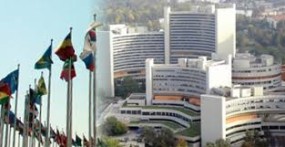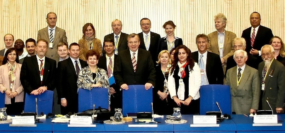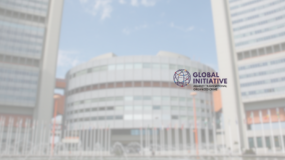Posted on 12 Feb 2018
Crime prevention necessitates an integrated mix of initiatives, not just those that fall within the scope of criminal law and justice systems, but also the wider social and cultural spheres.
There is a close link between organized crime and corruption, as both activities are intertwined through mutual instrumentality. Corruption offers the means to allow illicit markets to operate – by ensuring impunity for criminal actors, facilitating methods of legitimizing illicit gains or ensuring flows of illicit goods through trafficking networks and across borders. Conversely, the power, influence and wealth accrued through organized crime places criminal actors in a position to influence state officials and shape the wider political economy.
In the context of development, the impact of organized crime on governance and the rule of law is heightened, particularly in fragile and post-conflict states. Organized crime and corruption are increasingly recognized as key spoilers for development, inhibiting economic growth and amplifying state fragility. Although neither are new phenomena, over recent years their spread, impact and influence have reached unprecedented levels, with profound effects felt in developed and developing nations alike.
The inextricable links between organized crime and corruption require an integrated, coordinated approach to prevention. This includes minimizing the opportunity for such activities, targeting illicit profits (including anti-money-laundering efforts and asset recovery), nurturing an anti-crime culture and concerted international cooperation efforts. Greater integration and cross-fertilization in the various UN anti-crime, drugs and terrorism instruments are also needed to help promote more effective prevention, prosecution and adjudication of organized crime.
In the international space, the UN Convention against Transnational Organized Crime (UNTOC) and the UN Convention against Corruption (UNCAC) represent the normative, criminal-justice-based platforms for the prevention of organized crime and corruption. The developmental platform, which covers prevention in the wider social and cultural space, is represented by Sustainable Development Goals 16.4 and 16.5. These aim (respectively) to ‘significantly reduce all forms of organised crime’ (with a particular focus on illicit arms and financial flows) and ‘substantially reduce corruption and bribery in all their forms’ by 2030. These goals are a significant step towards approaching organized crime as a mainstream development concern and extending responsibility for its prevention across a broader range of development actors.
What is the preventative potential of UNTOC and UNCAC, and how can the synergies between them be maximized to support a wider, development-based approach to preventing organized crime and corruption?
UNTOC
Together with the investigation and prosecution of offences, the convention also incorporates prevention within its scope. UNTOC aims to promote international cooperation with a view to both combating and preventing transnational organized crime.
Article 31 contains the key material dealing with prevention, obligating states parties to undertake a range of measures. These include developing projects and establishing best practices and policies aimed at the prevention of transnational organized crime; reducing opportunities for transnational organized crime to occur in lawful markets; promoting cooperation between law enforcement and the private sector – and several others.
Any offence described under UNTOC – whether it be participation in an organized-crime group, money laundering, corruption, the obstruction of justice and so on – has the potential to be approached from a preventative angle.
However, the preventative impact of this convention is rather limited, since offences under UNTOC have no sanctioning dimension. Hence, states that fail to fulfil their obligations under the convention face no consequences. To a certain extent, this limits the potential impact of the preventative activities outlined in Article 31.
This is not to say, however, that UNTOC is an unmitigated failure on the prevention front. For example, it has a well-developed preventative dimension when it comes to money laundering, as it promotes regulations for banks and other financial institutions to control transfers of illicit cash. Similarly, international cooperation through mutual legal assistance or extradition has a preventative function by helping to eradicate safe havens for criminals.
UNCAC
As with UNTOC, prevention is also a central tenet of UNCAC, evident in its three main stated aims – to ‘promote and strengthen measures to prevent and combat corruption more efficiently and effectively; to ‘facilitate international cooperation and technical assistance in the prevention of and fight against corruption’; and to ‘promote integrity, accountability and proper management of public affairs’.
In contrast to UNTOC, however, this convention devotes an entire chapter to prevention measures, as opposed to just a single article. These cover a wide array of areas, such as creating and maintaining preventative anti-corruption bodies; strengthening systems for ensuring integrity of civil servants; and applying codes of conduct for public officials.
In terms of prevention measures, UNCAC offers a much richer and more detailed resource than UNTOC. However, as the linkages between organized crime and corruption at both domestic and transnational levels are becoming more complex and frequent, the prevention measures articulated by the two conventions can, and should, be applied in an integrated and mutually supportive way.
More focused attention to the prevention of organized crime and corruption is needed, particularly at the international level, to integrate the normative and developmental platforms offered by UNCAC, UNTOC and the Sustainable Development Goals. Only in combination do these platforms offer a cohesive and effective crime-prevention strategy. This way, the preventative measures contained in the conventions can be better leveraged to inform the developmental efforts associated with achieving the Sustainable Development Goals.
Also read an interview with Ugi, on the important role of civil society in UNTOC and UNCAC review mechanisms.
Illustration by: C R Sasikumar



